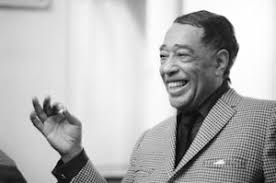(单词翻译:单击)
听力文本
I'm Shirley Griffith. And I'm Ray Freeman with the VOA Special English program PEOPLE IN AMERICA. Every week we tell about a person who was important in the history of the United States. Today, we tell about the great jazz musician, Edward Kennedy Ellington. He was better known to the world as "Duke" Ellington. That was Duke Ellington's orchestra playing "Take the 'A' Train." Just the first few notes of that song are enough to tell any music expert who is playing. It is like a musical sign. The sign says, "Listen! You are about to hear something by Duke Ellington's orchestra." It was always the first song his orchestra played. "Take the 'A' Train" was only one of hundreds of songs he played all over the world. Edward Kennedy Ellington was born on April twenty-ninth, eighteen ninety-nine, in Washington, D.C. His family lived in the African-American area of Washington. It was a time when racial separation was the law in much of the United States. Racial laws and racial hatred were to follow Edward Kennedy Ellington all through his life. Young Edward liked clothes. A friend once looked at him and said, "You look like a duke." He meant that Edward 's clothes were so good that he looked like a member of a royal family. Other friends laughed. Yet they all began calling him "Duke." The name stayed with him the rest of his life. When he was about seven years old, Duke Ellington began to play the piano. When he was in high school, he began to paint. He became very good at both. A famous art school in New York City invited him to take classes there. But he had already decided to become a musician. He got his first professional job in nineteen sixteen. He played music at night and painted business signs during the day. The most popular music back then was called ragtime. Duke listened to ragtime piano players who visited Washington. Then he tried to play as well or better than they did. Years later, he recorded a song that showed how well he could play the piano. It is a ragtime song called "Lots o' Fingers."

Duke Ellington moved to New York City in nineteen twenty-three. He had a small band. Soon it was playing at the famous Cotton Club, where it would play for many years. Duke and his band could play at the Cotton Club. But they could not come to hear anyone else, because they were black. Duke did not become angry. He did not become filled with hatred toward white people. He let his music speak for him. In time, Duke Ellington's band got bigger. It was a jazz orchestra. More people began hearing the orchestra's music. They could hear it on a radio program from the Cotton Club. The program often could be heard all over the United States. Their first hit record was one of their most famous. It was recorded in October of nineteen thirty. It was called "Dreamy Blues." Later, Duke changed the name. It is still considered a great blues song and is often played today. It is called "Mood Indigo." An orchestra is a team made up of individual players. Like any team, the individuals in an orchestra must cooperate to produce good music. The leader of a team, or an orchestra, must learn the strength and the weakness of each member. And a good leader will use this knowledge to make the team or orchestra produce the best result. In the nineteen twenties and nineteen thirties, members of a dance orchestra never stayed with one group for long. Musicians moved from group to group. Yet, when a musician played with Duke Ellington, he usually stayed, sometimes for many years. This had an effect on the group's music. Duke would write music especially for musicians in the orchestra. His songs used the strengths of one or two individuals. The rest of the orchestra cooperated with them. This cooperation became the method Ellington used again and again to produce beautiful sound colors. His music could make people feel deep emotions -- feelings of happiness, or sadness, or loneliness or joy. Some members of the Duke Ellington orchestra were the best jazz musicians of their day. Their cooperation produced a sound that is almost impossible for others to re-create. To create that same sound, you would need the musicians who first played the music. One of those musicians was "Cootie" Williams. He played the trumpet in the Duke Ellington orchestra for many years. Duke Ellington used the strength of Cootie Williams when he wrote a song called, "A Concerto for Cootie." Critics said this work showed the unity between the music writer, the leader of the orchestra, and its members. Listen as Cootie Williams seems to lead the orchestra. Hear how the other members cooperate with him to produce a very beautiful and special sound.
重点解析
1.be about to 将要
China's pork prices might be about to come off the barbecue, but the structure of the agricultural sector means volatile prices will remain a problem.
国的猪肉价格可能即将开始回落,但农业部门的现有结构意味着波动性较大的食品价格仍然将是一个问题。
2.stay with和…待在一起
I became greater by far than anyone in Jerusalem before me. In all this my wisdom stayed with me.
这样,我就日见昌盛,胜过以前在耶路撒冷的众人。我的智慧仍然存留。
3.filled with充满
We were filled with hope, with passion, with dreams for the future.
我们浑身上下都是希望和激情,对未来充满了梦想。
4.all over 遍及
He went all over the country, rousing the workers and peasants for the struggle against oppression.
他到全国各地,唤起工人和农民进行反压迫斗争。
5.made up of由…组成
This collection is made up of three parts: poems, essays and short stories.
这本集子是由诗、散文和短篇小说三部分组合而成的。
6.cooperate with与…合作
It implies that the US must cooperate with China and Japan on macroeconomic and trade policy.
这意味着美国必须在宏观经济和贸易政策方面与中国和日本合作。
参考译文
我是雪莉·格里菲思,我是雷·弗里曼,这里是VOA慢速英语栏目《美国人物志》。每周我们会讲述一位美国历史上的重要人物的故事。今天我们讲述伟大的爵士音乐家爱德华·肯尼迪·艾灵顿的故事。他更广为人知的名字是艾灵顿公爵。这首是艾灵顿的管弦乐队演奏的《乘坐A路火车》。仅仅听下这首歌的前几个音符就足以判断正在演奏的音乐家是谁。这就像是一种音乐符号,这个符号告诉你,“听,你将要听到的是艾灵顿公爵乐队演奏的歌曲。”艾灵顿公爵乐队经常把这首歌曲作为他们演奏的第一首歌曲。《乘坐A路火车》仅仅是艾灵顿在全世界表演的上百首歌曲之一。爱德华·肯尼迪·艾灵顿于1899年4月29日出生在华盛顿特区。他家住在华盛顿的非裔美国人聚居区。那是一个种族隔离在美国大部分地区作为法律的时代。在爱德华·肯尼迪·艾灵顿的一生中,种族法律和种族仇恨一直伴随着他。年轻的爱德华喜欢衣服。有一次,一个朋友看着他说:“你看起来像个公爵。”这个朋友的意思是说爱德华的衣服太漂亮了,他看起来就像皇室的一员。其他朋友都笑了。然而他们都开始叫他“公爵”。这个名字伴随他一生。艾灵顿公爵七岁时开始弹钢琴。当他在高中的时候,他开始画画。这两方面他都很擅长。纽约一所著名的艺术学校邀请他去那里上课。但他已经决定成为一名音乐家。他在1916年得到了第一份职业工作。他晚上演奏音乐,白天画商业标志。当时最流行的音乐叫拉格泰姆。公爵听了访问华盛顿的拉格泰姆钢琴演奏者的演奏。然后他试着演奏得和他们一样好或者更好。多年后,他录制了一首歌,这首歌显示了他钢琴弹得有多好。这是一首拉格泰姆的歌曲,叫做《很多手指》。艾灵顿公爵于1923年搬到纽约市。他有一个小乐队。不久,乐队在著名的棉花俱乐部演出,在那里他们将演出很多年。公爵和他的乐队可以在棉花俱乐部演奏。但是他们不能来听其他人的演奏,因为他们是黑人。公爵没有生气。他也没有对白人充满仇恨。他用音乐来表达自己。艾灵顿公爵的乐队终于壮大起来。它成为一个爵士乐团。更多的人开始听公爵的管弦乐队的音乐。人们可以从棉花俱乐部的广播节目中听到艾灵顿公爵乐队的歌曲。这个节目经常在美国各地播放。他们的第一张畅销唱片是他们最著名的唱片之一。这是于1930年10月录制的唱片。这首歌的名字叫做《梦幻布鲁斯》。后来,公爵改变了这首歌的名字。时至今日,它仍然被认为是一首伟大的布鲁斯歌曲,人们仍经常演奏它。它被称为《情绪靛蓝》。管弦乐队是由单个演奏者组成的团队。就像任何团队一样,管弦乐队中的成员必须合作才能演奏出好的音乐。团队或管弦乐队的领导者必须了解每个成员的长处和短处。一个好的领导者会利用这些知识使团队或管弦乐队创作最好的作品。在20世纪20年代和30年代,一个舞蹈乐团的成员从来没有在一个团体呆过很长时间。音乐家们从一个乐队换到另一个乐队,但是,当一个音乐家和艾灵顿公爵演奏时,他经常会留下来,有时候长达数年。这影响了乐队的音乐,公爵经常专门为乐队的成员创作歌曲。公爵的歌曲会发挥乐队一两个人的长处,其他的成员就和他们配合。这种协作方法成为艾灵顿反复使用的创作美丽声音色彩的方法。艾灵顿的音乐能让人感受到深刻的情感,幸福、忧伤、孤独或欢乐的感觉。有些艾灵顿乐队的成员是当时最好的音乐家。乐队成员的合作创造了其他人几乎难以再次创作的音乐。要创作同样的音乐,你需要能演奏这种音乐的音乐家。乐队的成员之一是库蒂·威廉姆斯,他在艾灵顿公爵的乐队里演奏小号,合作了很多年。艾灵顿公爵创作的《库蒂的协奏曲》就发挥了威廉姆斯的长处。评论家们说,这首歌曲展示了作曲家、乐队指挥和成员之间的团结。这首歌中库蒂·威廉姆斯似乎成为了乐队指挥,让我们听听其他成员是如何配合他演奏出这首美丽而特别的歌曲。
译文为可可英语翻译,未经授权请勿转载!


